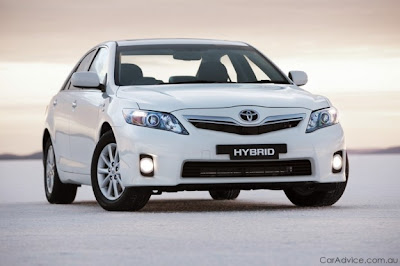
Toyota Carmy Hybrid
Up until recently, driving a hybrid car required some sort of sacrifice, whether it be space, performance or anonymity. However, with the introduction of the Camry Hybrid, one could argue that Toyota has given the buying public a hybrid that demands no sacrifices.
If judged only on its merits as a competent (if not superior) midsize sedan, the Toyota Camry Hybrid would score well. We've found that it shares all the attributes that makes the conventional Camry one of the best family sedans out there: a comfortable cruiser, more than adequate power, a top-notch interior, lots of amenities and plenty of room for five. The fact that its fuel economy betters that of most compact cars in the process and is priced well within the normal range for an average car is icing on the hybrid cake.
Current Toyota Camry Hybrid
As its name implies, the Toyota Camry Hybrid is a regular Camry sedan with a gasoline-electric hybrid powertrain. The hybrid system is comprised of a 2.4-liter four-cylinder gasoline engine (producing 147 horsepower and 138 pound-feet of torque) and a 45-hp electric motor. The Camry Hybrid can run on any combination of the two power sources.
Power is transferred to the front wheels via a continuously variable transmission (CVT). The CVT was chosen for its ability to keep the gas engine in its most efficient power band. We found that the Camry Hybrid's combination of the gas and electric motors felt surprisingly robust. Acceleration betters most four-cylinder sedans and is not far behind many six-cylinder ones.
Since the gas engine of the Toyota Camry Hybrid will shut down at a stop and under some driving conditions, the air-conditioning and power-steering systems are driven electrically and powered off of the vehicle's batteries. This maximizes fuel economy and guarantees that the air-conditioning will continue to operate.
As with most hybrid vehicles, fuel economy is especially sensitive to driving style, but a combined city/highway average in the mid-30s shouldn't be too difficult to achieve for most drivers.
Very little is sacrificed for these fuel economy gains. Most of the expected safety features, such as front seat-mounted side airbags, side curtain airbags, a driver knee airbag and antilock brakes are included, and stability control is optional. Most modern-day convenience features are also standard. Major options include a navigation system, leather seating and a premium audio system.
Those consumers considering the purchase of a Toyota Camry Hybrid should be aware that it does cost more. Compared to the similarly equipped four-cylinder Camry XLE, for instance, the Hybrid costs approximately $1,500 more. The Hybrid is also a bit deficient in terms of luggage space -- trunk capacity drops from the regular Camry's 15 cubic feet to 10.6 due to the space taken up by the battery pack.
On the whole, however, the Camry Hybrid is a very complete package. It's roomy, comfortable and fully up to date with the latest features. And thanks to the Prius, Toyota has shown that its hybrid powertrains are able to meet consumers' expectations of durability and reliability. For a hybrid family sedan, it doesn't get better than the Toyota Camry Hybrid.
Used Toyota Camry Hybrid Models
The Camry Hybrid was introduced for the 2007 model year as part of the regular Camry's redesign. Since then, it has received revised front-end styling, a new instrument cluster and unique upholstery made of silk protein and synthetic fiber for 2010.










0 comments:
Post a Comment